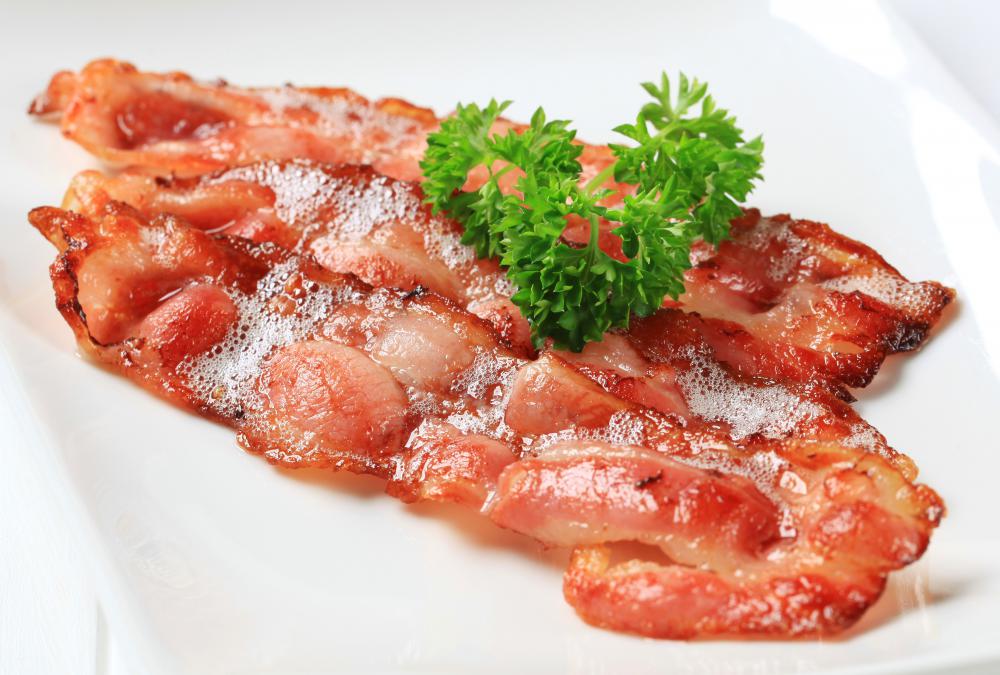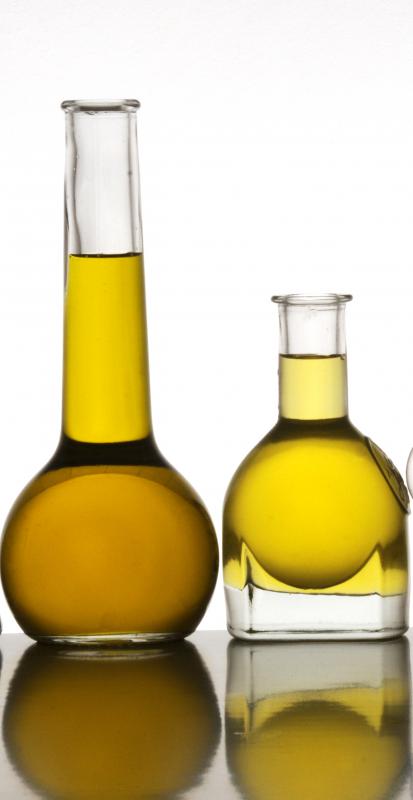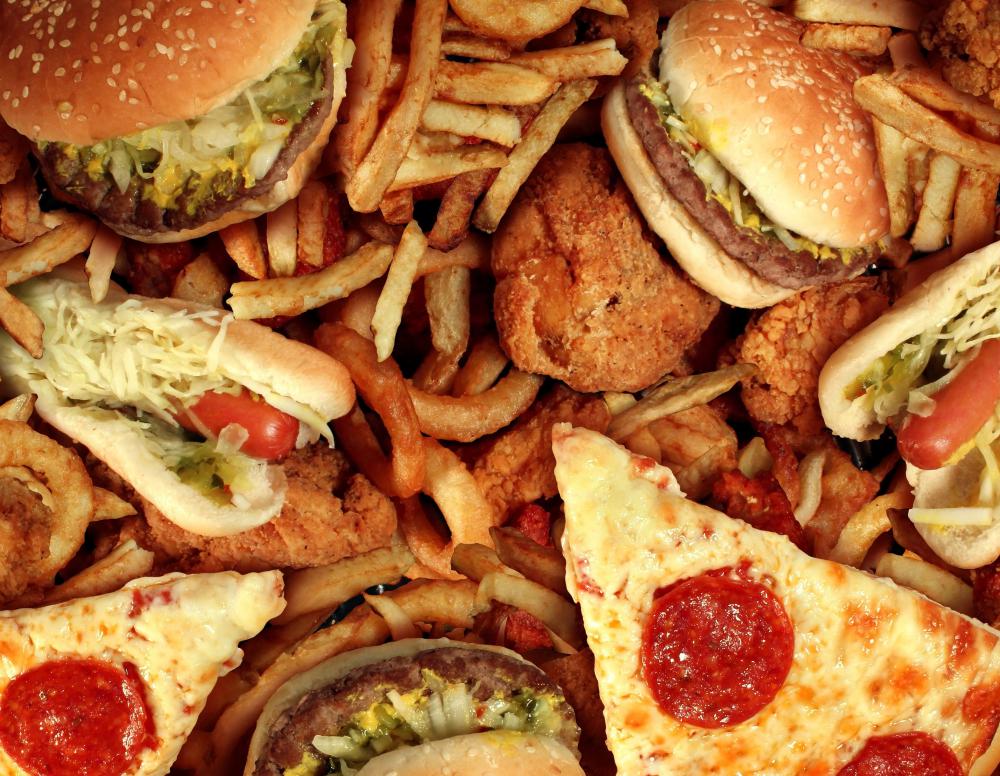At TheHealthBoard, we're committed to delivering accurate, trustworthy information. Our expert-authored content is rigorously fact-checked and sourced from credible authorities. Discover how we uphold the highest standards in providing you with reliable knowledge.
What Is Saturated Fat?
Saturated fat is one of the two main categories of fats that appear in foods. It is distinguished from unsaturated fat in that there are no double bonds between carbon atoms in its chemical makeup, so that the fatty acids are saturated with hydrogen. Naturally occurring saturated fat, such as the fat found in animal-based foods, congeals when cool, while naturally occurring unsaturated fat, such as olive oil, remains fluid. Saturated fat is less likely to spoil than unsaturated fat and more stable during cooking.
The World Health Organization (WHO), along with the United States Centers for Disease Control (CDC) and Food and Drug Administration (FDA), urges people to limit their intake of saturated fat, as many experts have linked it with cardiovascular disease. A diet high in saturated fats may lead to high cholesterol, which in turn may lead to atherosclerosis, coronary heart disease, and stroke. Saturated fat intake raises one's low density lipoprotein (LDL) levels — that's the "bad" cholesterol. Unsaturated fat, on the other hand, raises the high density lipoprotein (HDL) levels, resulting in a desirable cholesterol profile.

While fat is a necessary part of a healthy diet, most nutritionists agree that as many fat sources as possible should be unsaturated, unhydrogenated fat, such as that found in olive oil, fish, nuts, and avocado. Saturated fat is found mainly in animal products, including meats and dairy foods, but is also found in some plant sources. Coconut oil, cottonseed oil, and palm kernel oil all contain saturated fat, for example.

The American Heart Association (AHA) suggests that saturated fat should make up no more than seven percent of one's daily caloric intake. To manage cholesterol, consider replacing saturated fats wherever possible with unsaturated fats. Use olive oil when cooking instead of butter, for example, and choose fish more often than red meat. Unsaturated fat not only raises HDL levels, but also lowers LDL levels. While the older FDA guidelines recommended that unsaturated fats should not exceed 30% of one's daily caloric intake, the new guidelines have eliminated this limit.

It should also be noted that when selecting an ideal source of healthy fats in one's diet, it's important to consider the source completely. All products with low saturated fat are not necessarily healthy. When choosing sources for healthy fats, it is important to prefer more natural and less-processed sources.
AS FEATURED ON:
AS FEATURED ON:















Discussion Comments
Canola oil (aka Canadian Oil) is a GMO crop grown largely in Canada and very unhealthy!!
Saturated fat in its natural state in whole foods (meat, eggs, fish, coconut) is the healthiest source or caloric intake for humans.
I've been researching this for months since my mom had a heart attack and I was diagnosed with very high blood pressure and cholesterol levels. Do some digging into the commonly spread "wisdom" and you'll see there is no clear science to back the blaming of atherosclerosis on saturated fats.
Oh, for the commenter who said Canola oil is healthy, search out the online video on how it's made. I think you'll change your mind.
All naturally occurring fats and oils contain some saturated and some unsaturated fatty acids.
Lard (pig fat) for example contains about 40 percent oleic acid, a monounsaturated fatty acid.
Calling all saturated and animal fats bad is poor science. Chain length of the fatty acids is probably just as important and trans is but one of many structural options. Read a chemistry book.
You mentioned how saturated fats increase your LDL levels, but you failed to mention that saturated fats also increase your HDL and decrease your apo(a) levels. Also, an increase in LDL levels is not always a bad thing. There are different types of LDL: small, dense LDL and larger, less dense LDL. The larger and less dense LDL is harmless, whereas the smaller, more dense LDL is responsible for the damage. The increase in LDL levels caused by saturated fats is actually due to small, dense LDL being transformed into large, less dense LDL. This results in a greater mass of LDL, with the total amount of LDL remaining the same (measured as increased LDL). But the transformation of these small LDLs into large LDLs is beneficial. So saturated fats increase HDL, decrease apo(a) and make the LDL proportions more favorable (good, good, good).
Cheers, Thomas (Biochemist)
the main stream nutritionists have everything about fat the other way around. we should consume a wide variety of fresh, unprocessed saturated fats in our diet to make our cell walls strong. one thing mainstream experts don't know is that they make 50 percent or more of our cell membranes.
Anything a nutritionist say is because they are lied to in health class based off of studies that don't make sense. we have been eating animal fats for 99 percent of our existence and only been eating vegetable oils since yesterday, when we became fatter.
Looks like most people here are not so wise about canola oil. Rapeseed oil is not a poison, firstly. So people you can ignore what is mentioned by one of the commenters. It is next to olive oil in being on of the healthiest oils. It has high amounts of unsaturated fat and good amount of Omega3 and Omega 6 which is really healthy for the heart.
So please don't be fooled. Canola oil is also used as bio diesel but that doesn't mean it is poisonous!
It is multipurpose.
Also, saturated fats in limited amounts is all our body requires. So please don't believe the fact they are good for health. They are not. They by nature tend to harden and sometimes block the flow of blood to heart.
So please don't dismiss this article as false!
Saturated fat, like butter or coconut oil is more stable when heated. Polyunsaturated and monounsaturated oils are not stable when heated to certain levels.
Might be not be so good advice to recommend olive oil over butter for cooking!
After going through all advices and comments, what to eat and what not to is not clear. This 7% and 10 % of total calori intake is vague. Whoe bothers in routine how many calories he is taking daily or find average ...in case some one desires to help heart diseases ...eat or do not eat should be clarified.
Totally agree with anon37794 The information given here is largely a fallacy that come about from severely outdated information from companies that have a common interest in selling their products such as margarine (one step off plastic) Canola oil a bio diesel for engines (poison)etc. If you want a good example take a look at an oil like coconut oil heavily laden in saturated fat like Lauric acid.
I have a simple question: should i take saturated fat or not?
This information is not correct. Saturated fats are good for you. why would you start eating against your genetics?
Saturated fat is an excellent fat. The bulk of fat should be a combination of saturated and monounsaturated. Polyunsaturates in their natural state(eg fish and nuts) are good but should not be the main fat. Those from refined oils should not be consumed at all.
Examples of good fats: are butter, coconut oil, beef/mutton tallow, duck fat, olive oil, macadamia nut, fish fat.
Examples of bad fats: Soybean oil, Sunflower oil, safflower oil, cottonseed oil(basically any high pufa refined oil), margarines both soft and hard, and hydrogenated/partially hydrogenated oil/trans fat.
Holy **** you guys are knowledge deprived... saturated fats aren't this bad. The only thing they are focusing on is that it raises your LDL, which i guess for most of the Americans is a bad thing... And canola oil... its made from rapeseed guys, its poison. And btw those calorie restrictive diets mostly don't work.
Hmm...not very wise about saturated fats.
Is pizza considered junk food or not?
For someone who is on a 2000 calorie diet, saturated fat intake should not exceed 20g. Total fat intake should not be more then 65g. Another good guideline is not to even buy products that contain more than 4g of saturated fat per serving.
Post your comments